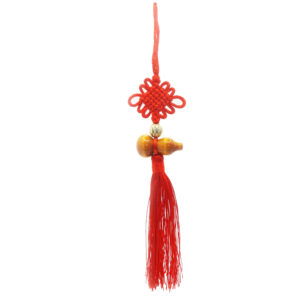The Chinese auspicious product known as “wu lou” is a gourd-shaped object that is commonly associated with good luck, longevity, and protection against negative energy or illnesses. It is also known as a “hulu” or “calabash” in English.
In Chinese culture, the wu lou is believed to possess the ability to absorb negative energy and promote positive chi (life force) in its surroundings. It is often used as a decorative item or a symbol of good fortune in homes, businesses, and even in Feng Shui practices.
The shape of the wu lou is inspired by a traditional bottle gourd, which has a natural association with health and vitality in Chinese folklore. The gourd is considered a potent symbol of longevity and good health due to its durability and its ability to store water and medicine.
Wu lous are typically made from materials such as metal, glass, or wood. They are often intricately designed and may be embellished with symbols, patterns, or auspicious motifs. Some wu lous may also feature auspicious inscriptions or be adorned with auspicious items like red ribbons or coins.
Many people hang wu lous in their homes, particularly in areas associated with health, such as the bedroom or the kitchen. It is believed that the wu lou’s presence can ward off illnesses, promote well-being, and attract positive energy into the living space. In addition to homes, wu lous can also be found in offices, shops, and other places where people seek protection and good luck.
Overall, the wu lou is a cherished symbol in Chinese culture, valued for its association with good fortune, longevity, and protection against negative energies or illnesses.
Showing the single result



